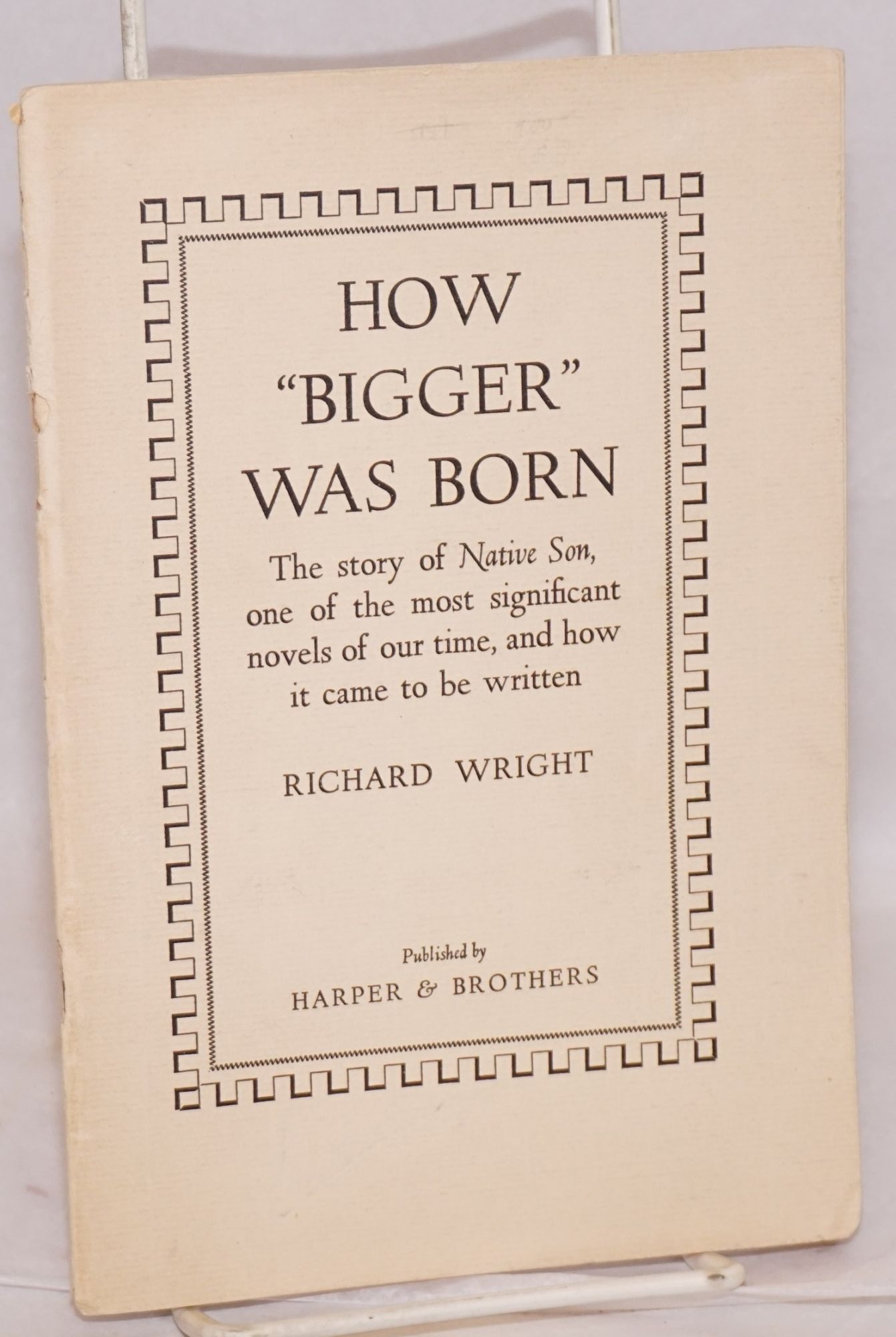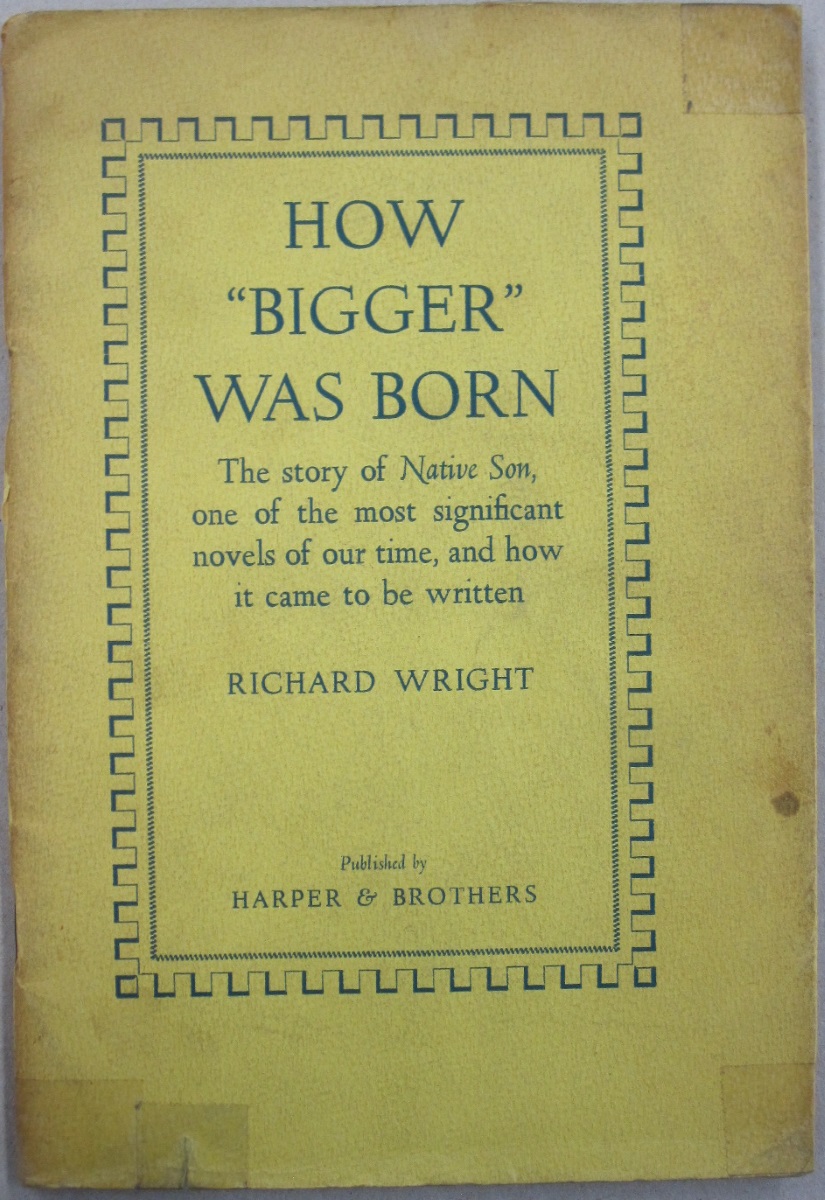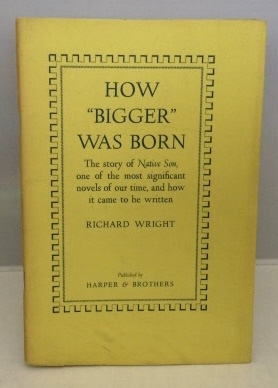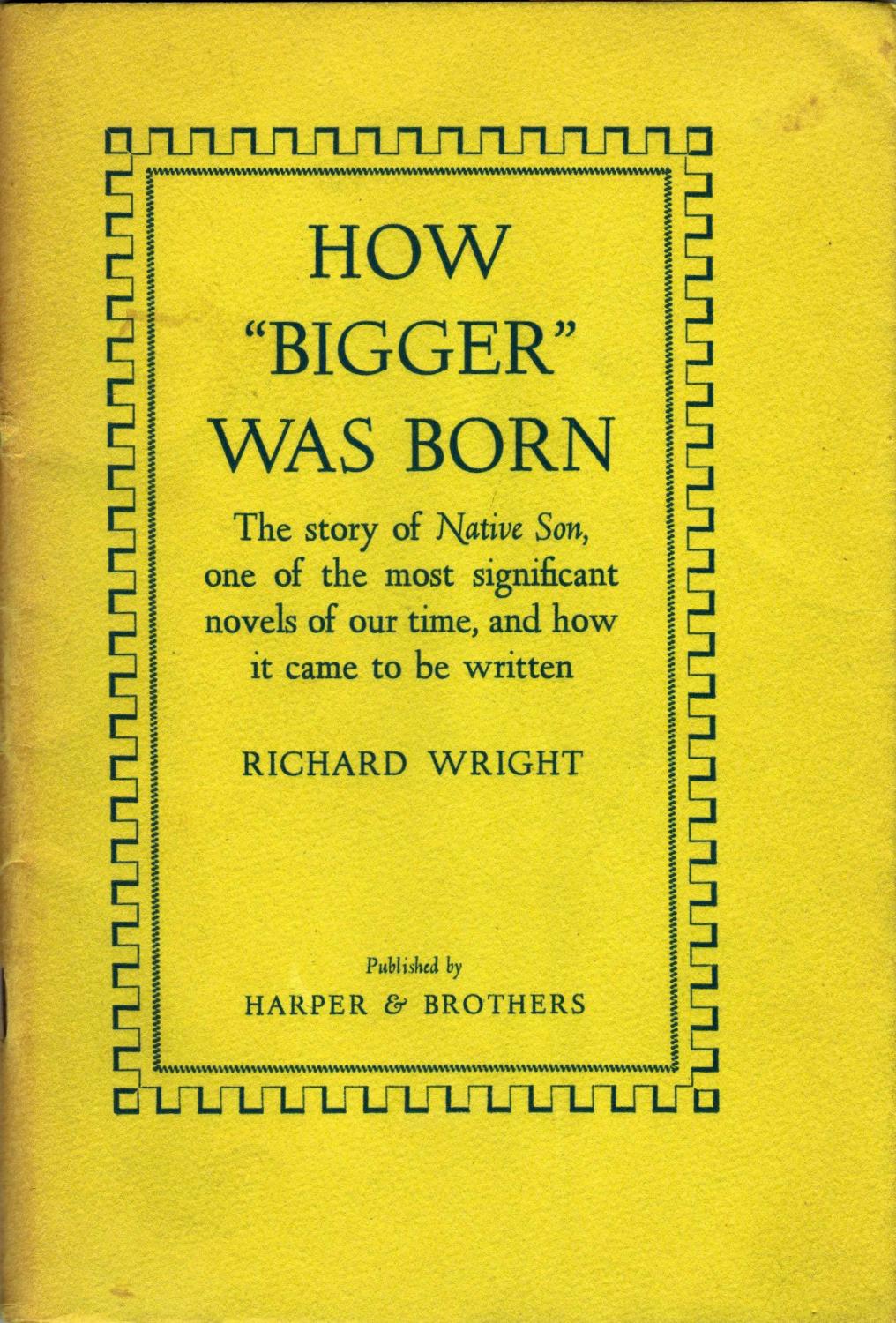Available Copies from Independent Booksellers

Price: US$20.00 + shipping
Description: Reprint. 359 p. Tan cloth covered boards. Rust brown title box, spine; black titles. Stamped edge border. DJ in aqua, yellow; dark blue titles. Dark red top page edges. Less common edition, African American Novel: Urban family member Bigger is chauffeur to a wealthy suburban white philanthropist, some of whose profits originate on the backs of those who live in Chicago's tenements. Bigger is headed for jail from the first chapter. Wright prefaces the novel with "How 'Bigger' was Born", pp. xiii-li (new material, this edition). This reprint edition stops at p. 359. The Contents offer "Some Notable Comments on 'Native Son'" beginning page 361; there are no pages removed. The DJ spine and front however is decorated by streaming review commentary. Good in good dust jacket. Signed by previous owner. Half-inch cloth edge tear to top right, book. Corner bump. Minor sun-fade at spine edges. Closed tears to jacket. Complete and Unabridged. "Author's Edition". No price listed. 1 0.0
Seller: Hedgehog's Whimsey BOOKS etc., Newport, NH, U.S.A.

WRIGHT, Richard. NATIVE SON. Grosset & Dunlap, New York, 1940.
Price: US$20.00 + shipping
Condition: Very Good
Description: Octavo; li, 359 pages, variant tan cloth, top edge stained red, fore-edge untrimmed, a bit cocked The Harper Code on the copyright page indicates that this text was done in 1947. Added to this edition is the unabridged text of Richard Wright's 1940 article, "How 'Bigger' Was Born", which appeared in the 'Saturday Review of Literature" in June 1, 1940. . See 2012 exhibition at the Library of Congress: "Books That Shaped America".
Seller: Thomas J. Joyce And Company, Chicago, IL, U.S.A.

Wright, Richard. Native Son. Harpers, New York, 1940.
Price: US$25.00 + shipping
Condition: Very Good
Description: Previous owner's book plate on front paste down. Wright's classic story of life in the "most segregated city in America" Chicago, in the early 20th century.This outstanding novel tells the story of 20-year-old Bigger Thomas, a black American youth living in utter poverty. Bigger lived in a poor area on Chicago's South Side in the 1930s. While not apologizing for Bigger's crimes, Richard Wright portrays a systemic inevitability behind them. Bigger's lawyer makes the case that there is no escape from this destiny for his client or any other black American, since they are the necessary product of the society that formed them and told them since birth who exactly they were supposed to be. "No American Negro exists," James Baldwin once wrote, "who does not have his private Bigger Thomas living in his skull." Frantz Fanon discusses this feeling in his 1952 essay "L'Expérience Vécue du Noir", or "The Fact of Blackness". "In the end," writes Fanon, "Bigger Thomas acts. To put an end to his tension, he acts, he responds to the world's anticipation." Wright based aspects of the novel on the 1938 arrest and trial of Robert Nixon, executed in 1939 following a series of "brick bat murders" in Los Angeles and Chicago. Wright's protest novel was an immediate best-seller, selling 250,000 hardcover copies within three weeks of its publication by the Book-of-the-Month Club on March 1, 1940. It was one of the earliest successful attempts to explain the racial divide in America in terms of the social conditions imposed on African-Americans by the dominant white society. It also made Wright the wealthiest black writer of his time and established him as a spokesperson for African-American issues, and the "father of Black American literature." As Irving Howe said in his 1963 essay "Black Boys and Native Sons," "The day Native Son appeared, American culture was changed forever. No matter how much qualifying the book might later need, it made impossible a repetition of the old lies . [and] brought out into the open, as no one ever had before, the hatred, fear, and violence that have crippled and may yet destroy our culture." The novel's treatment of Bigger and his motivations is an example of literary naturalism. First Edition A-P Second State binding. Along with Ellison's Invisible Man and Baldwin's Go Tell It On the Mountain, one of the indisputable mid-century classics of African-American literature.
Seller: A Turn of the Page Books, Fishers, IN, U.S.A.

Wright, Richard. Native Son. Harper, New York, 1940.
Price: US$45.00 + shipping
Condition: Good
Description: Wright's classic story of life in the "most segregated city in America" Chicago, in the early 20th century.This outstanding novel tells the story of 20-year-old Bigger Thomas, a black American youth living in utter poverty. Bigger lived in a poor area on Chicago's South Side in the 1930s. While not apologizing for Bigger's crimes, Richard Wright portrays a systemic inevitability behind them. Bigger's lawyer makes the case that there is no escape from this destiny for his client or any other black American, since they are the necessary product of the society that formed them and told them since birth who exactly they were supposed to be. "No American Negro exists," James Baldwin once wrote, "who does not have his private Bigger Thomas living in his skull." Frantz Fanon discusses this feeling in his 1952 essay "L'Expérience Vécue du Noir", or "The Fact of Blackness". "In the end," writes Fanon, "Bigger Thomas acts. To put an end to his tension, he acts, he responds to the world's anticipation." Wright based aspects of the novel on the 1938 arrest and trial of Robert Nixon, executed in 1939 following a series of "brick bat murders" in Los Angeles and Chicago. Wright's protest novel was an immediate best-seller, selling 250,000 hardcover copies within three weeks of its publication by the Book-of-the-Month Club on March 1, 1940. It was one of the earliest successful attempts to explain the racial divide in America in terms of the social conditions imposed on African-Americans by the dominant white society. It also made Wright the wealthiest black writer of his time and established him as a spokesperson for African-American issues, and the "father of Black American literature." As Irving Howe said in his 1963 essay "Black Boys and Native Sons," "The day Native Son appeared, American culture was changed forever. No matter how much qualifying the book might later need, it made impossible a repetition of the old lies . [and] brought out into the open, as no one ever had before, the hatred, fear, and violence that have crippled and may yet destroy our culture." The novel's treatment of Bigger and his motivations is an example of literary naturalism. First Edition A-P Second State binding. Along with Ellison's Invisible Man and Baldwin's Go Tell It On the Mountain, one of the indisputable mid-century classics of African-American literature. Book has gray cover and good condition. Back strip has darkened and is no longer readable. Spine ends are bumped, but corners are straight and pointed. Text block is tight and complete with no marks or mars. All and all a decent copy of this important book.
Seller: A Turn of the Page Books, Fishers, IN, U.S.A.

Price: US$49.95 + shipping
Description: Octavo, navy blue cloth (hardcover), uncut, xi + 359 pp. The dust jacket is olive green; the cloth binding is blue, with gilt chain links illustrating the upper quarter of the spine, a black spine label, and gilt letters. Very Good, with former-owner inscription to ffep and tanning to endpapers; in a Good+, myalr protected dust jacket with edgewear that includes light chipping. From dust jacket: On this remarkable novel Henry Seidel Canby makes the following comment: This powerful and sensational novel is very difficult to describe so as to convey its real prupse and its real strength. But it is important to describe it accurately, because it is certainly the finest novel as yet written by an American Nego -- not that it was chosen by the Book-of-the-Month Club just because it was written by a Negro. It would have been chosen for its deep excitement and intense interest whether written by white, yellow, or black. Yet, nevertheless, this is a novel which only a Negro could have written; whose theme is the mind of the Negro we see every day; whose emotion is the emotion of that native born American under the stress of a social situation difficult in the extreme; whose point and purpose are not race war or propaganda of any kind, but to show how a "bad nigger" is amde from human material that might have become something very different. Superficially, Native Son is a crime story, adventurous, exciting, often terrible -- with two murders, a chase and a gun fight over the roofs of Chicao, a trial, and what might have been, but was not, a rape. It is the old story of a man hunted down by society. But the reader will get through only a few chapters before h e realizes that there is something different in this story. Bigger -- and we all know Bigger -- is no persecuted black saint. His family is a good tenement family, as tenement families go; but he is a bad actor from the first. He is mean; he is a coward; he is on occasion liar, thief, and bully. There is no sentimentalism in the writer who created Bigger, and made him chauffeur in the family of a wealthy philanthropist who spent some of the money wrung from Negro tenements on benefits for the race. Bigger is headed toward jail from the first chapter. When Mary Dalton, the flighty daughter of the philanthropist, asks Bigger to help along her intrigue with her Communist lover (also a negrophile), he has no compunctions. But he did not mean to kill her, he did not want to kill her, though he hated patronizing whites. Had her blind mother not come in at the fatal moement, the girl would have slept off her drunkeness, and Bigger would never have got beyond petty crime. With a skill which any master of the detective story might envy, Mr. Wright builds his book on the inevitable and terrifying results of an unpremeditated killing; the burning of the body; the false accusations; the murder of Bigger's Negro girl friend, lest she implicate him; the capture; the trial in which Mr. Max, the defending lawyer, pleads unsuccessfully the cause of a race driven toward crime, against a district attorney needing notoriety for his next election. And finally comes Bigger's confession -- not of the murder which was not a murder, and of the rape which was not a rape, but of the obscure inarticulate causes which made him hate, and made him try to make up for his sense of inferiority by aggressive acts against the society in which he lived. Literature, Americana. TAS
Seller: Lighthouse Books, ABAA, Dade City, FL, U.S.A.

Wright, Richard. How "Bigger" Was Born. Harper: New YOrk, NY. 1940, 1940.
Price: US$50.00 + shipping
Condition: Very Good
Description: Paperback, pamphlet, a later edition, paginated to LI (51) as for a preface to a reissue of the novel. Staple-bound. Clean, bright copy. About very good condition.
Seller: Tsunami Books, Eugene, OR, U.S.A.

Wright, Richard. Native Son. Harper & Brothers Publishers, New York, 1940.
Price: US$50.19 + shipping
Condition: Fine
Description: BOOK: Spine Bumped; Light Shelf Rub to Boards. DUST JACKET: Repaired; Lightly Creased; Moderately Chipped; Lightly Soiled; In Archival Quality Jacket Cover. SYNOPSIS: On this remarkable novel Henry Seidel Canby makes the following comment: "This powerful and sensational novel is very difficult to describe so as to convey its real purpose and its real strength. But it is important to describe it accurately, because it is certainly the finest novel as yet written by an American Negro - not that it was chosen by the Book-of-the-Month Club just because it was written by a Negro. It would have been chosen for its deep excitement and intense interest whether written by white, yellow, or black. Yet, nevertheless, this is a novel which only a Negro could have written; whose theme is the mind of the Negro we see every day; whose emotion is the emotion of that native born American under the stress of a social situation difficult in the extreme; whose point and purpose are not race war or propaganda of any kind, but to show how a "bad nigger" is made from human material that might have become something very different. Superficially, Native Son is a crime story, adventurous, exciting, often terrible - with two murders, a chase and a gun fight over the roofs of Chicago, a trial, and what might have been, but was not, a rape. It is the old story of a man hunted down by society. But the reader will get through only a few chapters before he realizes that there is something different in this story. Bigger - and we all know Bigger - is no persecuted black saint. His family is a good tenement family, as tenement families go; but he is a bad actor from the first. He is mean; he is a coward; he is on occasion liar, thief, and bully. There is no sentimentalism in the writer who created Bigger, and made him chauffeur in the family of a wealthy philanthropist who spent some of the money wrung from Negro tenements on benefits for the race. Bigger is headed toward jail from the first chapter. When Mary Dalton, the flighty daughter of the philanthropist, asks Bigger to help along her intrigue with her Communist lover (also a negrophile), he has no compunctions. But he did not mean to kill her, he did not want to kill her, though she hated patronizing whites. Had her blind mother not come in at the fatal moment, the girl would have slept off her drunkenness, and Bigger would never have got beyond petty crime. With a skill which any master of the detective story might envy, Mr. Wright builds his book on the inevitable and terrifying results of an unpremeditated killing; the burning of the body; the false accusations; the murder of Bigger's Negro girl friend, lest she implicate him; the capture; the trial in which Mr. Max, the defending lawyer, pleads unsuccessfully the cause of a race driven toward crime, against a district attorney needing notoriety for his next election. And finally comes Bigger's confession - not of the murder which was not a murder, and of the rape which was not a rape, but of the obscure inarticulate causes which made him hate, and made him try to make up for his sense of inferiority by aggressive acts against the society in which he lived. All this highly complicated story is handled with competence by Mr. Wright in a swift narrative style proceeding by staccato dialogue and with rapidly mounting suspense. The characters, too, are fully realized. There is a deadly satire in the portraits of the young radicals - Mary who is killed, and Jan, the Communist, who chooses Bigger to work on, not realizing that this kind of political pity is more offensive to a Negro than color prejudice. And the mob itself is a character, stirred up by sensational newspapers, getting blood-thirsty, wanting to lynch - the mob whose threatening roar is always in the background of the book and of the Negro's mind. Yet even in its characters this is not a vindictive book. Bigger dies without hate for anything, except the obscure circumstances which compelled .
Seller: Past Pages, Oshawa, ON, Canada

Wright, Richard. How Bigger was Born. Harper & Brothers, 1940.
Price: US$59.50 + shipping
Condition: Very Good
Description: some small spots on the front cover front hinge is starting
Seller: Robert S. Brooks, Bookseller, Bristol, WI, U.S.A.

Price: US$87.50 + shipping
Description: xiii - li p., later printing, 5.5x8 inches, stapled printed white wraps, spinefold is split almost all the way, else find signs of slight general handling. Paginated as for a preface to a reissue of the novel.
Seller: Bolerium Books Inc., San Francisco, CA, U.S.A.

Wright, Richard. HOW BIGGER WAS BORN. New York, Harper, 1940.
Price: US$125.00 + shipping
Condition: Very Good
Description: 8vo, decorated yellow wrappers, a very good copy, slightly soiled with small loss top right edge.stated FIRST EDTION.vv9/2/1
Seller: NUDEL BOOKS, New York, NY, U.S.A.

Richard Wright. HOW "BIGGER" WAS BORN. Harper & Brothers, US, 1940.
Price: US$150.00 + shipping
Condition: Very Good
Description: The story of Native Son, one of the most significant novels of our time, and how it came to be written. Pages are clean and unmarked. Text block has light shelf wear. Light soiling to lower edge of front cover; otherwise, covers are clean and bright. Binding is tight. Clear plastic dust jacket is clean and unmarked.
Seller: Atlanta Vintage Books, Atlanta, GA, U.S.A.

Richard Wright. How "Bigger" Was Born. Harper & Brothers, New York, 1940.
Price: US$150.00 + shipping
Description: 20 x 13.5 cm. Octavo. 39 pages. Staple bound yellow pamphlet. Stated first edition. There has been some tape reenforcement to the cover. Some soiling to the cover. The Story of Native Son One of the Most Significant novels of our time, and how it came to be written.
Seller: Midway Book Store (ABAA), St. Paul, MN, U.S.A.

Price: US$200.00 + shipping
Condition: Very Good
Description: This is a staplebound pamphlet with medium cardstock covers. The pamphlet is in Very Good+ condition and was issued without a dust jacket. The yellow covers have some ground-in dirt and beginning toning, especially to the spine. The text pages are mostly clean and bright, but have a bit of light, generalized toning. "I am not so pretentious as to imagine that it is possible for me to account completely for my own book, Native Son. But I am going to try to account for as much of it as I can, the sources of it, the material that went into it, and my own years' long changing attitude toward that material." "Native Son was published by Harper & Brothers on March 1, 1940. On March 12 of the same year, Richard Wright delivered the lecture, "How Bigger Was Born, " at Columbia University in New York City. He eventually gave this lecture four more times, twice in Harlem, and in Chicago and North Carolina. Harpers soon published the lecture as a pamphlet, and it was included in subsequent editions of the novel. It is also included in the restored text of Native Son, published by The Library of America in 1991, and HarperPerennial in 1993."
Seller: S. Howlett-West Books (Member ABAA), Modesto, CA, U.S.A.

Wright, Richard. Native Son. Harper, New York, 1940.
Price: US$225.00 + shipping
Condition: Very Good
Description: Wright's classic story of life in the "most segregated city in America" Chicago, in the early 20th century.This outstanding novel tells the story of 20-year-old Bigger Thomas, a black American youth living in utter poverty. Bigger lived in a poor area on Chicago's South Side in the 1930s. While not apologizing for Bigger's crimes, Richard Wright portrays a systemic inevitability behind them. Bigger's lawyer makes the case that there is no escape from this destiny for his client or any other black American, since they are the necessary product of the society that formed them and told them since birth who exactly they were supposed to be. "No American Negro exists," James Baldwin once wrote, "who does not have his private Bigger Thomas living in his skull." Frantz Fanon discusses this feeling in his 1952 essay "L'Expérience Vécue du Noir", or "The Fact of Blackness". "In the end," writes Fanon, "Bigger Thomas acts. To put an end to his tension, he acts, he responds to the world's anticipation." Wright based aspects of the novel on the 1938 arrest and trial of Robert Nixon, executed in 1939 following a series of "brick bat murders" in Los Angeles and Chicago. Wright's protest novel was an immediate best-seller, selling 250,000 hardcover copies within three weeks of its publication by the Book-of-the-Month Club on March 1, 1940. It was one of the earliest successful attempts to explain the racial divide in America in terms of the social conditions imposed on African-Americans by the dominant white society. It also made Wright the wealthiest black writer of his time and established him as a spokesperson for African-American issues, and the "father of Black American literature." As Irving Howe said in his 1963 essay "Black Boys and Native Sons," "The day Native Son appeared, American culture was changed forever. No matter how much qualifying the book might later need, it made impossible a repetition of the old lies . [and] brought out into the open, as no one ever had before, the hatred, fear, and violence that have crippled and may yet destroy our culture." The novel's treatment of Bigger and his motivations is an example of literary naturalism. First Edition A-P Second State binding. Along with Ellison's Invisible Man and Baldwin's Go Tell It On the Mountain, one of the indisputable mid-century classics of African-American literature.Book has gray cover and in good condition. The back back strip has darkened but is easily readable. Spine ends are bumped, but corners are straight and pointed. In a later dust jacket (no price to flap) which has chipping to the fore edge, darkening to the spine and a 1/8" chip missing from the head of the spine. All and all a good copy of this important book.
Seller: A Turn of the Page Books, Fishers, IN, U.S.A.

Wright, Richard. How Bigger Was Born. Harper & Brothers, New York, 1940.
Price: US$275.00 + shipping
Condition: Near Fine
Description: 39 pages. First edition, first printing. The story of how Native Son was written. Fine book with the spine very slightly browned in wrappers. A beautiful copy!
Seller: Fireproof Books, MINNETONKA, MN, U.S.A.

Wright, Richard. Native Son. Harper, New York, 1940.
Price: US$475.00 + shipping
Condition: Near Fine
Description: Near fine true first edition, first issue dark blue cloth. Copyright page states "First Edition" and has publisher's code "A-P." Octavo (8 x 5 1/2 x 204 x 141 mm). xi, [1, blank], 359, [1, blank] pp. Title printed in red and black. Original dark blue cloth stamped and lettered in red and white on front cover and spine. Housed in a beautiful facsimilie dust jacket which is Bordart protected. Wright's classic story of life in the "most segregated city in America" Chicago, in the early 20th century.This outstanding novel tells the story of 20-year-old Bigger Thomas, a black American youth living in utter poverty. Bigger lived in a poor area on Chicago's South Side in the 1930s. While not apologizing for Bigger's crimes, Richard Wright portrays a systemic inevitability behind them. Bigger's lawyer makes the case that there is no escape from this destiny for his client or any other black American, since they are the necessary product of the society that formed them and told them since birth who exactly they were supposed to be. "No American Negro exists," James Baldwin once wrote, "who does not have his private Bigger Thomas living in his skull." Frantz Fanon discusses this feeling in his 1952 essay "L'Expérience Vécue du Noir", or "The Fact of Blackness". "In the end," writes Fanon, "Bigger Thomas acts. To put an end to his tension, he acts, he responds to the world's anticipation." Wright based aspects of the novel on the 1938 arrest and trial of Robert Nixon, executed in 1939 following a series of "brick bat murders" in Los Angeles and Chicago. Wright's protest novel was an immediate best-seller, selling 250,000 hardcover copies within three weeks of its publication by the Book-of-the-Month Club on March 1, 1940. It was one of the earliest successful attempts to explain the racial divide in America in terms of the social conditions imposed on African-Americans by the dominant white society. It also made Wright the wealthiest black writer of his time and established him as a spokesperson for African-American issues, and the "father of Black American literature." As Irving Howe said in his 1963 essay "Black Boys and Native Sons," "The day Native Son appeared, American culture was changed forever. No matter how much qualifying the book might later need, it made impossible a repetition of the old lies . [and] brought out into the open, as no one ever had before, the hatred, fear, and violence that have crippled and may yet destroy our culture." The novel's treatment of Bigger and his motivations is an example of literary naturalism. A beautiful copy of this classic American novel.
Seller: A Turn of the Page Books, Fishers, IN, U.S.A.

Price: US$517.50 + shipping
Description: 8 x 5.25, printed stapled self wraps, 51 pp, covers worn, chipped, torn, and creased, contents toned and thumbed. Later printing ("c-q") but INSCRIBED "To Horace with all my own best . . ." AND SIGNED "Dick and Ellen" BY THE AUTHOR RICHARD WRIGHT.
Seller: John K King Used & Rare Books, Detroit, MI, U.S.A.